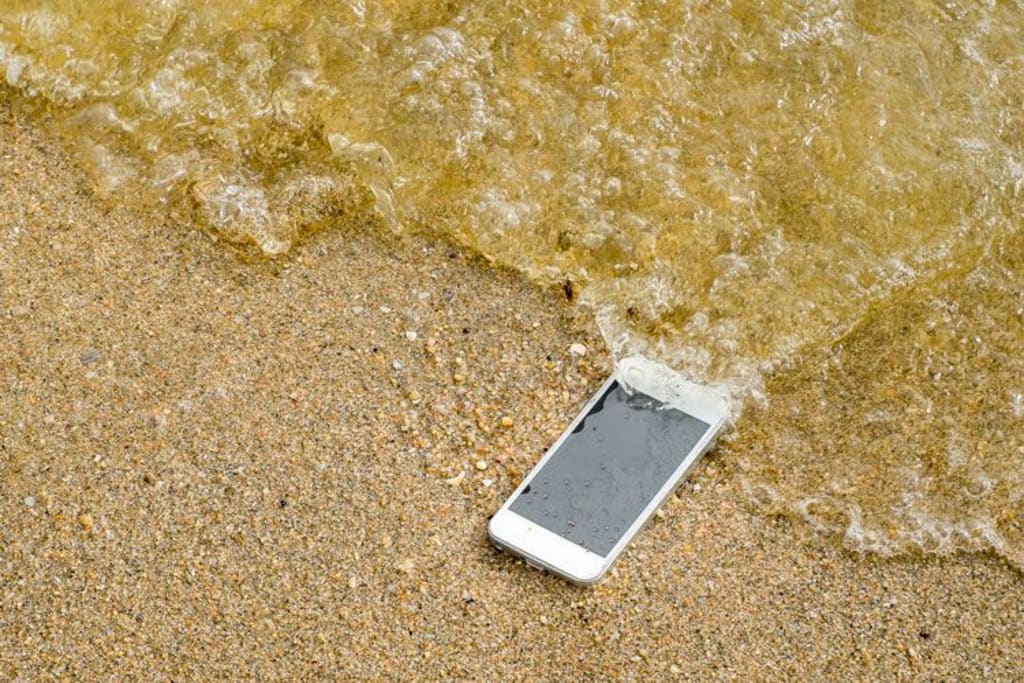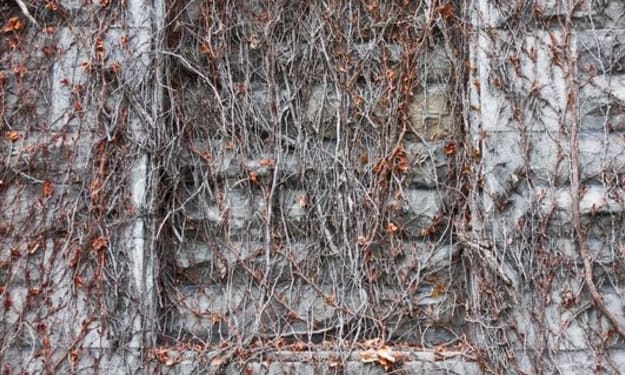
On an unusually quiet day like today, when the waves are crashing on the shore just right and the birds have all flown south for the winter, I can almost hear my mother’s singing. My mother loved to sing. She was a soft soprano, like Minnie Ripperton, and on days like this, I’m never sure if it’s actually her or just my memory of her.
When the waves are rockier, her singing voice becomes mangled by her stern words of unsolicited advice.
“Social media is a prison!” she’d bark at me. “I don’t know how you kids do it, those phones ruin lives,” she’d say shaking her head.
But I was 16, and her comments just aggravated me. We’d argue for hours, me explaining that this isn’t the 70s and people don’t just show up to each other’s houses anymore and her suggesting we get a landline and me crying at the mere thought of social suicide. A landline? What was she thinking? Besides, it wasn’t just social media. I was in love with a boy named Johnny and my friends thought he liked me too. How was I supposed to keep in touch with him if he couldn’t text me? And then there was the boredom: there was nothing to do outside. My phone was a source of entertainment; it connected me to worlds I might have otherwise not been able to explore. But she didn’t understand any of that. She just yelled her old-folks yell and ranted about the good ‘ol days. How I long for that yell now, just to hear her voice and know that it’s hers. I wouldn’t even yell back, I’d just enjoy the sound of her organic, unfiltered voice.
On most days, and you’d only know this of you'd spent hours staring off into the horizon like I have, the waves don’t move at all. They’re incredibly still, almost like a very expensive, hyperrealistic painting. The thing that reminds me that they are real, and not some screensaver, is this tiny ship that passes along the horizon every sunset. I used to be curious about it, wondering where it was going and why did it leave everyday at the same time. I’ve never seen it come back, but it must, because it goes out again the very next day. To occupy the time, sometimes I make up stories about that ship. It’s a Victorian woman running away from her tyrant father each night and sailing to meet her prince charming. It’s a career sea man, with dreams of being an author, forever bound to his watery casket by generations of obligation. It’s a kitten looking for her mother, doomed to roam the seas until she finds her. That’s the story I resonate with most.
I was 17 when the virus hit and I lost my mother. History is funny that way. Every few years or so a new plague hits, and you read about them but it’s hard to picture them. The Black Death, the Antonine Plague, The Great Plague of Marseille, The Cholera Pandemic, COVID-19. My family and I had undoubtedly survived them all. Our lineage was tough and unyielding. Ancestors younger than me were nurses and caretakers for the sick. One of my great great great grandfathers was even in my 9th grade history book for his work with the Great Plague of Milan. They called him a “Hero for the Ages” though his contribution did nothing for my popularity. It’s hard to be popular when everyone is wearing a mask or stuck at home. I think that’s why I spent so much more time on my phone: it gave me a peace that the walls of my house could not. I could be close to my friends without touching them. And when everything began to feel normal again, it was just so much easier for us all to continue on like it wasn’t, locking ourselves in our rooms, sending snaps and memes back and forth. It felt safer and I was happy.
My 17th birthday was spent on lockdown. All the restaurants were closed. My favorite amusement park was one of the first things to go. “A cesspool for germs” the news called it. I remember the cake my mother baked me made me cry. Normally, she would have bought my cake from our favorite bakery owned by this little old man and his little old wife. But COVID took their shop too and she had to bake me a cake herself. I should have been grateful, she tried her hardest on that cake, but my mother was a terrible cook and I could see the egg shells sticking out from underneath the icing. Plus, I wanted my cake. I wanted the red velvet cake with cream cheese icing and tiny pink roses drawn on top. I wanted the cute little white box with a red Smith’s Sweets written across the top in the old woman’s beautiful handwriting. I wanted the big pink bow they always tied around it just for me. I didn’t want my mother’s monstrous yellow cake that leaned slightly and had white icing carelessly flung all over the place. I wanted normalcy; a visible and tangible return to the life I used to live. I locked myself in my room that day and cried into the dark hours of the morning.
“Why,” I’d whispered with my head tilted upwards, “Why me? Why now? How is this fair?”
No answer.
“Please take COVID away. Take us from this plague,” I said, my tears hot on my cheeks.
Still no answer.
Angrily, I screamed and threw everything off my desk. I knocked my book case over and tore my sheets. The only thing that stood after the wake of my wrath was a small model ship inside of a glass bottle I’d received from my father as a birthday gift earlier that day. I’d positioned it in front of a poster of the the sun setting on an ocean so that if I looked closely enough, it looked like it was moving across the horizon. I think that’s why I like that ship so much, the one I see now every sunset. It reminds me of home; years ago when things were normal. I’d prayed for normalcy and a return to the mundane and I felt unheard but I think He listened.
I was among the first to go. Sometimes, when I realize that, I feel small and inadequate. I feel like I let generations of relentless giants down. My heritage was spotless, or so it had been told to me. My family beat every plague, pandemic and pestilence for generations and I succumbed to this one. On the day it happened, my mother crept into my room early one Sunday morning. Though things were seemingly better, most stores and restaurants were reopened and amusement parks and gyms had been functional for some time with strict restrictions, I’d had another breakdown. This time, Johnny, the love of my life, had found a girlfriend on his trip to Paris. He’d invited a group of us, but since it was so far, my parents wouldn’t let me go. I threw a tantrum and cried for hours, destroying my room and that ship. I buried myself in my phone until I’d fallen asleep; the phone was still lit up to reveal Johnny’s Instagram.
My mother’s sure fire broken heart remedy was a trip to the beach. I resisted, not ready to leave my bed yet, but she dragged me out anyway. The whole car ride there I scrolled down the endless timeline, liking, reposting and tagging my sorrows away. My heart was torn in two, but at least I had a worthy distraction. I could faintly hear my mother’s nagging, begging me to get off my phone and pay attention to my family. At the beach I took my place in the sand, only looking up to position the camera in front of the vast waters. My mother’s begging and warning is only a distant memory to me now.
When it happened it was quick, all that had been left in the sand was my phone. My parents spent the rest of the beach day searching for me. They tried calling the police, but unbeknownst to them, thousands of other people just like me had seemingly vanished into thin air. I spent the time banging on the hard glass, hoping someone would hear me, but my efforts proved to be in vain: my phone had died and I was hidden deep inside the dark technological barrier. My family went home that evening and I never saw them together again; I don’t even remember what my father and brother looked like. My mother, however, used to visit frequently. That first year she’d come and sit next to that phone on the beach and talk to me every day.
She knew she couldn’t hear me responding, but I was. Sometimes she’d sing, she’d learn new songs and teach them to me. I’m sure she looked quite silly singing to a phone, but then again, somehow, I knew there were other mothers singing to other daughters who’d been trapped inside their cellphones. She said she’d contemplated taking me home, putting me on the shelf in my room and making me as comfortable as a girl inside of a phone could be, but she thought the fresh air was better for me.
In the following years, things changed. My mother visited less often, eventually only opting to come see me on my birthday, she was pregnant again the last time I saw her, so I’m sure she has her hands full with the new baby by now. Technology has be come a societal pariah. I’ve survived on the sand for so long because no one will come near me. Television screens, computers even some cars have become a source of fear for most people. The average person would rather bike 20 miles to the next town over than drive the much shorter distance. Children and their parents spend the days together, likely fearing the tablets and projectors of the schoolhouse. COVID is still ever present, so work is mailed in from home now. I’ve sat here, positioned in the sand for three years, waiting for things to change, hoping for a cure for this new virus. There hasn’t been, and it seems like the world has gone on without us. I don’t even have so much as a friend inside her phone to talk to. My mother said, last time I spoke to her, that Johnny’s mother told her that he’s planning on marrying that girl from Paris. He’s only 20, but he’s in love and she’s happy for them.
“That could have been you,” I heard her sigh sadly.
It could have been, I suppose. I spent months blaming her for this. I wouldn’t have been on my phone if I’d been in Paris, I’ve thought. But that’s not the truth. I would have found something to like or to post or to tweet and I would have been continents away from home and stuck inside my phone.
It was my 20th birthday yesterday. When she visited, my mother cried. I don’t think she was crying because her oldest child was stuck inside a cellphone, I think she cried because of all the time I missed and would miss because I refused to look up. I hoped COVID would go away and strangely enough, now I miss the simple COVID reality. At least that came with a warm bed and people I could talk to. Before she left, she wordlessly stared at the horizon with me, watching as my ship passed by.
“Huh,” I heard her say, “You know it’s strange. If you look at that mural long enough It looks like that ship is moving. But I’m sure you know that. You’ve been looking at it for years.”
About the Creator
NatahYah
Yod.Hey.Uau.Hey. | YA Fiction | Poetry | Historical Fiction | Word Art
Check out my small business: AncientPathSE.com






Comments
There are no comments for this story
Be the first to respond and start the conversation.